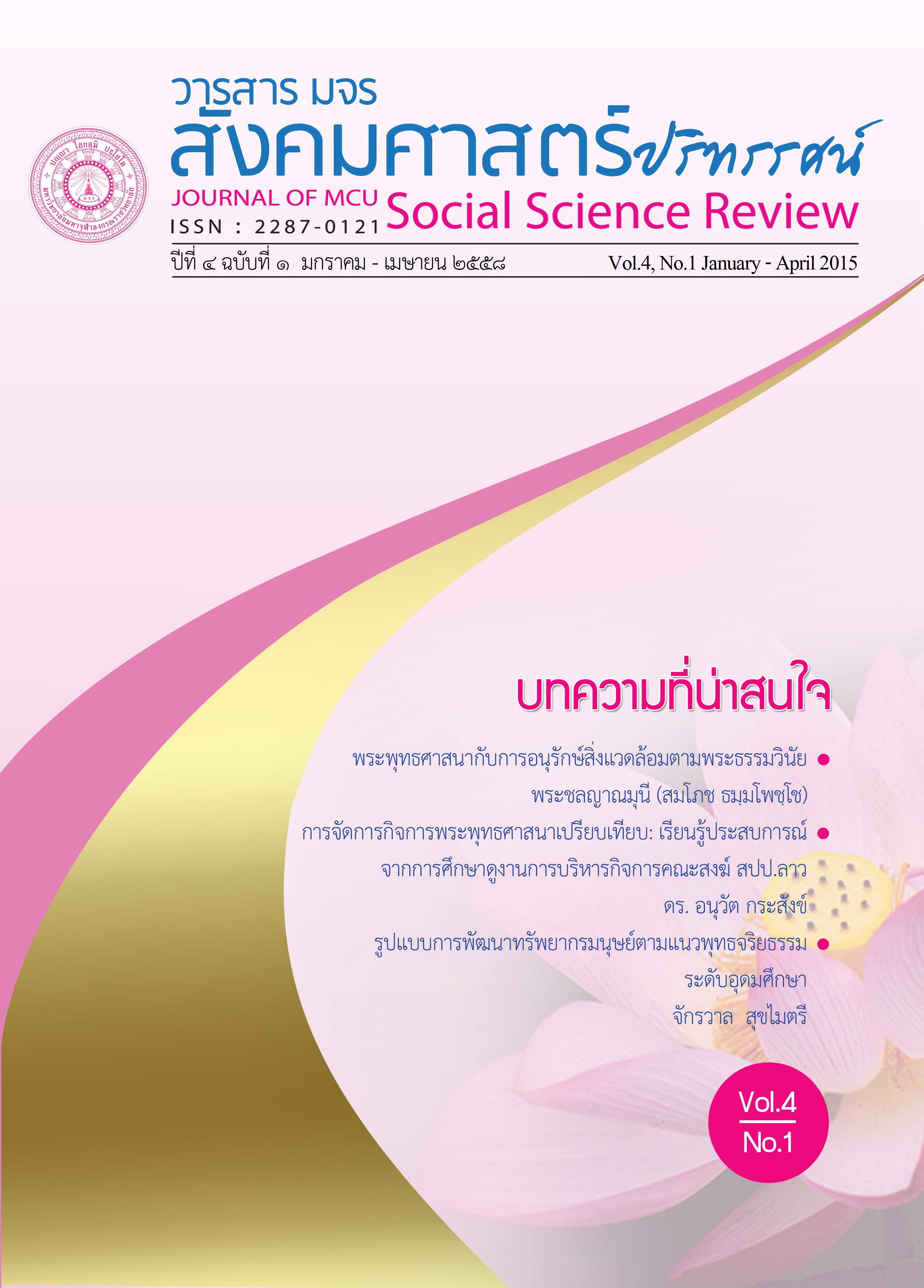รูปแบบการส่งเสริมจริยธรรมทางการบริหารตามหลักธรรมาภิบาลของผู้นําองค์กร ปกครองส่วนท้องถิ่นในเขตภาคเหนือตอนล่าง
คำสำคัญ:
รูปแบบ, การส่งเสริมจริยธรรม, ธรรมาภิบาล, ผู้นําองค์กรปกครองส่วนท้องถิ่น, ภาคเหนือตอนล่างบทคัดย่อ
การวิจัยนี้มีวัตถุประสงค์ ๓ ประการ ได้แก่ ๑) เพื่อศึกษาแนวคิด ทฤษฎีและหลักพุทธ ธรรมที่ส่งเสริมจริยธรรมทางการบริหารตามหลักธรรมาภิบาล ๒) เพื่อศึกษาสภาพจริยธรรมตาม หลักธรรมาภิบาล และ ๓) เพื่อเสนอรูปแบบการส่งเสริมจริยธรรมทางการบริหารตามหลักธรรมาภิ บาลของผู้นําองค์กรปกครองส่วนท้องถิ่นในเขตภาคเหนือตอนล่าง การวิจัยครั้งนี้ เป็นการวิจัยแบบ ผสมผสานวิธีระหว่างการวิจัยเชิงคุณและการวิจัยเชิงปริมาณ การวิจับเชิงคุณภาพเก็บข้อมูลจากผู้ให้ ข้อมูลหลักจํานวน ๓๐ รูป/คน เลือกแบบเจาะจงจากผู้ทรงคุณวุฒิ ผู้เชี่ยวชาญและผู้ที่มีส่วนได้ส่วน เสียกับการส่งเสริมจริยธรรมการบริหารตามหลักธรรมาภิบาล เครื่องมือสําหรับเก็บข้อมูล ได้แก่ แบบสัมภาษณ์เชิงลึกที่มีโครงสร้าง เก็บข้อมูลด้วยการสัมภาษณ์ตัวต่อตัว วิเคราะห์ข้อมูลด้วยการพรรณนาความ การวิจับเชิงปริมาณ เก็บข้อมูลจากกลุ่มตัวอย่าง ๑๑๘ คนจากประชากร ๑๖๖ คนที่อยู่ในองค์การบริหารส่วนตําบลที่ได้รับรางวัลการบริหารจัดการที่ดี ๔ แห่ง วิเคราะห์ข้อมูลด้วยสถิติพรรณนาได้แก่ ค่าร้อยละ ค่าเฉลี่ย และค่าส่วนเบี่ยงเบนมาตรฐาน
ผลการวิจัย พบว่า ๑. แนวคิด ทฤษฎี และหลักพุทธธรรมที่ส่งเสริมจริยธรรมทางการบริหารตามหลัก ธรรมาภิบาลของผู้นําองค์กรปกครองส่วนท้องถิ่น พบว่า ๑. หลักนิติธรรมกับหลักศีล พบว่า จะมี เนื้อหาเชิงของกฎหมาย กฎเกณฑ์ ระเบียบ วิธีปฏิบัติตนในองค์การบริหารส่วนตําบลรวมทั้ง จรรยาบรรณในความเป็นผู้นําองค์กรที่ดี ๒.หลักคุณธรรมกับหลักปัญญา พบว่า ระบบคุณธรรมเป็นเครื่องควบคุมการพฤติกรรมทั้งหมดให้ถูกต้อง ชัดเจน เพราะรากฐานของคุณธรรมอยู่ที่จิตสํานึกรัก ท้องถิ่น รักเพื่อนมนุษย์ไม่เอารัดเอาเปรียบต่อผู้อื่น และต่อสังคม ต.หลักความโปรงใส่กับหลักศีล พบว่า การเปิดเผยข้อมูล เปิดเผยกระบวนวิธีการทํางาน เปิดเผยงบประมาณ เพื่อให้มีการ ตรวจสอบทุกขั้นตอน ๔. หลักการมีส่วนร่วมกับหลักพาหุสัจจะ พบว่า กฎหมายหลายฉบับที่ พยายามระบุถึงขอบข่ายที่ประชาชนจะต้องเข้าไปมีส่วนร่วมทุก ๆ ขั้นตอนทางการบริหาร ๕. หลัก ความรับผิดชอบกับหลักศรัทธา พบว่า มีความกล้ายืนหยัดในสิ่งที่ตนเองกระทําและกล้าที่จะ รับผิดชอบผลต่อความคิดเพราะทั้งความคิด และการกระทําจะส่งผลทั้งคุณและโทษไปยังประชาชน และ ๖.หลักความคุ้มค่ากับหลักวิริยารัมภะ พบว่า ความสุจริตในการใช้งบประมาณอย่างประหยัด ใช้งบประมาณก็สามารถสร้างความดี ลดความชั่ว ลดความเห็นแก่ตัว ใช้ตนเองไปสู่ความเสียสละต่อ ส่วนร่วมมากยิ่งขึ้น
๒. สภาพจริยธรรมตามหลักธรรมาภิบาลของผู้นําองค์กรปกครองส่วนท้องถิ่นในเขต ภาคเหนือตอนล่าง รายด้าน พบว่า ๑. หลักนิติธรรม ๒. หลักคุณธรรม ๓. หลักความโปร่งใส ๔. หลักการมีส่วนร่วม ๕. หลักความรับผิดชอบ และ 5. หลักความคุ้มค่า โดยรวมอยู่ในระดับมาก (X = ๓.๖๗) และด้านการจัดทําคู่มือการสร้างธรรมาภิบาลในองค์กรอยู่ในระดับปานกลาง (X = ๓.๓๘)
๓. รูปแบบการส่งเสริมจริยธรรมตามหลักธรรมาภิบาลของผู้นําองค์กรปกครองส่วน ท้องถิ่นในเขตภาคเหนือตอนล่าง พบว่า ๑. หลักนิติธรรมกับหลักศีล ได้แก่กระตุ้นจริยธรรมด้วยการ กําหนดนโยบาย แผนงาน และโครงการต่าง ๆ และการสนับสนุนงบประมาณมาสู่กิจกรรมการ ส่งเสริมจริยธรรมของผู้นําในองค์กรปกครองส่วนท้องถิ่น ๒. ด้านความโปร่งใสกับศีลธรรม ได้แก่ต้อง ส่งเสริมการเรียนรู้ในระบบการตรวจสอบให้กับประชาชนได้มีความรู้ในการตรวจสอบ และกลไกการ ทํางานต่าง ๆ ๓. ด้านความรับผิดชอบกับหลักศรัทธา ได้แก่การปลูกจิตสํานึกความรับผิดชอบของ ภาวะผู้นําเชิงจริยธรรมซึ่งเป็นการป้องกันความชั่ว และการลดทุจริตคอร์รัปชัน ๔. ด้านความคุ้มค่า กับหลักวิริยารัมภะ ได้แก่การบริหารเพื่อส่วนร่วมเพื่อให้เกิดผลประโยชน์ต่อประชาชน มุ่งไปสู่การ ลดการใช้ทรัพยากรตามลักษณะของโครงการขององค์การบริหารส่วนตําบลตั้งไว้ ๕. ด้านการมีส่วน ร่วมกับหลักพาหุสัจจะ ได้แก่การสร้างกระบวนการให้ประชาชนได้เข้ามามีส่วนร่วมในการกําหนด นโยบาย การวางแผน การจัดโครงการ กระบวนการดังกล่าวจะต้องเกิดจากความต้องการของภาค ประชาชนเป็นหัวใจสําคัญ และ ๖. รูปแบบการส่งเสริมจริยธรรมของผู้นําองค์การบริหารส่วนตําบล จะต้องใช้คุณธรรมควบคุมกับปัญญาเสมอและพยายามส่งเสริมการศึกษาเรียนรู้ของประชาชน
เอกสารอ้างอิง
(๑) หนังสือ
ทิศนา แขมมณี, การพัฒนาคุณธรรมจริยธรรม และค่านิยม : จากทฤษฎีสู่การปฏิบัติ. กรุงเทพมหานคร: สภาสังคมสงเคราะห์แห่งประเทศไทย, ๒๕๔๒.
มหาจุฬาลงกรณราชวิทยาลัย. พระไตรปิฎกภาษาไทย ฉบับมหาจุฬาลงกรราชวิทยาลัย. กรุงเทพมหานคร : โรงพิมพ์มหาจุฬาลงกรราชวิทยาลัย, ๒๕๓๕.
สุจินต์ ธรรมชาติ, การวิจัยภาคปฏิบัติวิธีลัด, กรุงเทพมหานคร: มหาวิทยาลัยมหามกุฏราชวิทยาลัย, ๒๕๔๔.
(๒) เว็บไซต์
วริยา ชินวรรโณ, อ้างใน, สํานักข่าวอิศรา, เปิด ๑๕ ปัญหานักการเมืองไทย-โรคขาดภูมิคุ้มกันทางจริยธรรม, [ออนไลน์]. แหล่งข้อมูล : http://www.isranews.org/isranews news/item/๒๕๓๒๓-๐๑๘๓๐๑.html [ ๑๑ ตุลาคม ๒๕๕๕].
(๓) วิทยานิพนธ์
ขัตติยา กรรณสูต, “พฤติกรรมความซื่อสัตย์ของคนไทย”, รายงานวิจัย, ศูนย์ส่งเสริมและพัฒนาพลังแผ่นดินเชิงคุณธรรม (ศูนย์คุณธรรม), กรุงเทพมหานคร: ศูนย์คุณธรรม, ๒๕๕๑.
จิดาภา เร่งมีศรีสุข, “ยุทธศาสตร์การพัฒนาจริยธรรมาภิบาลขององค์กรปกครองส่วนท้องถิ่นในเขตภาคกลาง”, วิทยานิพนธ์พุทธศาสตรดุษฎีบัณฑิต สาขาวิชารัฐประศาสนศาสตร์, บัณฑิตวิทยาลัย: มหาวิทยาลัยมหาจุฬาลงกรณราชวิทยาลัย, ๒๕๕๖.
ภิศักดิ์ กัลยามิตร, จริยธรรมทางการบริหารจัดการภาครัฐที่ดีวิเคราะห์เชิงเปรียบเทียบการเทศบาลตําบลและองค์การบริการส่วนตําบล, วิทยานิพนธ์รัฐประศาสนศาสตร์ดุษฎีบัณฑิต, บัณฑิตวิทยาลัย : มหาวิทยาลัยราชภัฏวไลยอลงกรณ์ ในพระบรมราชูปถัมภ์, ๒๕๔๗.
๒. ภาษาอังกฤษ
(1) Book
Andrew W.Halpin. Theory and research in administration. New York: Macmmillan Company, 1966.
Bass, Bernard M. Leadership and Performance BeyondExpection. New York: The Free Press, 1985.
Dale Yoder. Personnel Principles and Policies. fourth printing. Englewood Cliffs : new Jersey Prentice-Hall. Inc, 1956.
James M. Lipham. and James A. Hoch. Jr.. “Leadership Theory.” in The Principalship : Foundations and FunctionsNew York : Harper & Row Publishers, 1974.
Normand L. Frigon. Sr.. Harry K. Jackson. Jr.. The Leader: Developing the Skills & Personal Qualities You Need to Lead Effectively. New York : American Management Association, 1966.
ดาวน์โหลด
เผยแพร่แล้ว
รูปแบบการอ้างอิง
ฉบับ
ประเภทบทความ
สัญญาอนุญาต
ลิขสิทธิ์ (c) 2018 วารสาร มจร สังคมศาสตร์ปริทรรศน์

อนุญาตภายใต้เงื่อนไข Creative Commons Attribution-NonCommercial-NoDerivatives 4.0 International License.
เพื่อให้เป็นไปตามกฎหมายลิขสิทธิ์ ผู้นิพนธ์ทุกท่านต้องลงลายมือชื่อในแบบฟอร์มใบมอบลิขสิทธิ์บทความให้แก่วารสารฯ พร้อมกับบทความต้นฉบับที่ได้แก้ไขครั้งสุดท้าย นอกจากนี้ ผู้นิพนธ์ทุกท่านต้องยืนยันว่าบทความต้นฉบับที่ส่งมาตีพิมพ์นั้น ได้ส่งมาตีพิมพ์เฉพาะในวารสาร มจร สังคมศาสตร์ปริทรรศน์ เพียงแห่งเดียวเท่านั้น หากมีการใช้ภาพหรือตารางหรือเนื้อหาอื่นๆ ของผู้นิพนธ์อื่นที่ปรากฏในสิ่งตีพิมพ์อื่นมาแล้ว ผู้นิพนธ์ต้องขออนุญาตเจ้าของลิขสิทธิ์ก่อน พร้อมทั้งแสดงหนังสือที่ได้รับการยินยอมต่อบรรณาธิการ ก่อนที่บทความจะได้รับการตีพิมพ์ หากไม่เป็นไปตามข้อกำหนดเบื้องต้น ทางวารสารจะถอดบทความของท่านออกโดยไม่มีข้อยกเว้นใดๆ ทั้งสิ้น





